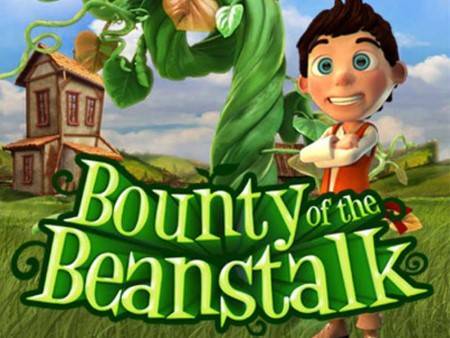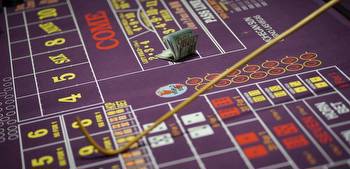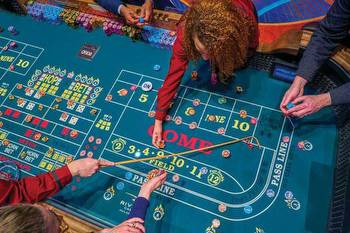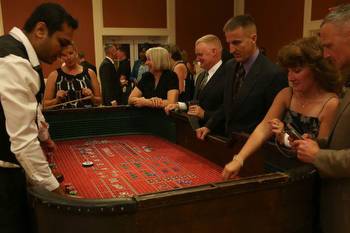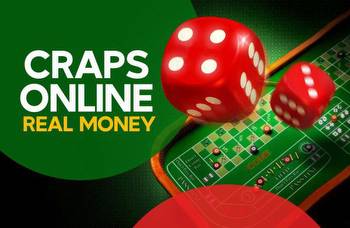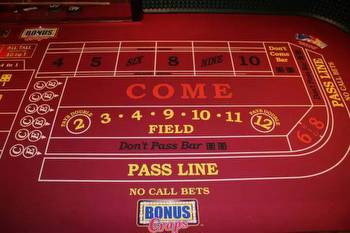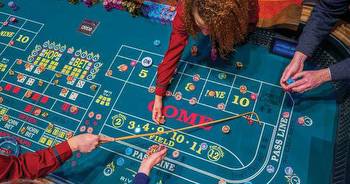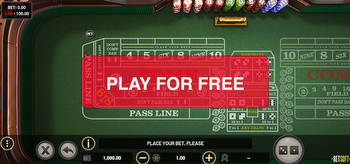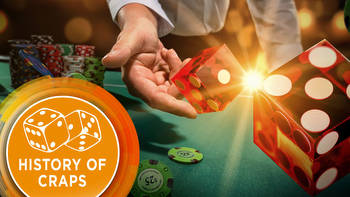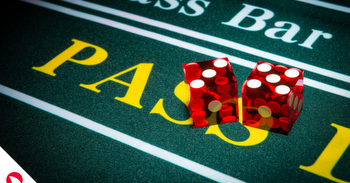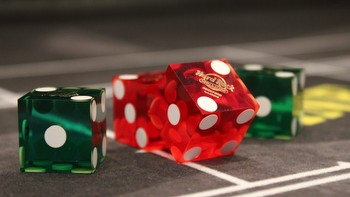Learn the history, rules and methods to master casino craps
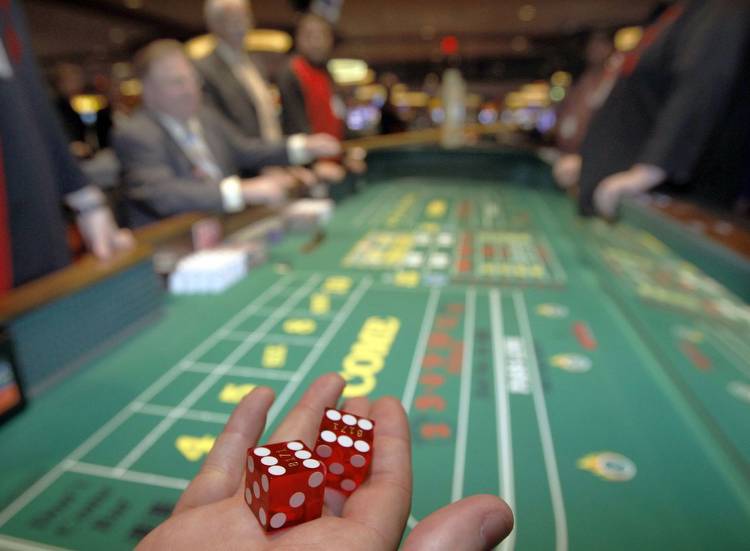
Dice games have been around for hundreds of years. Craps, often hailed as the king of casino dice games, allow you to bet on the outcome of a pair of dice. This guide will take you through the history of craps, from its humble origins to its modern-day domination of land-based casinos and digital platforms.
If you’re new to craps, it’s a game where bets are placed on the results of dice rolls, either individual rolls or a sequence of them. In craps, you can bet against other players in informal settings, known as “street craps,” or against a bank in more formal settings, often referred to as “casino craps” or “table craps.”
As with most classic casino games, there are several versions of the history of craps. Some feature Roman soldiers who wagered using knuckle bones from farm animals as dice and their shields as the table. Another version claims the game originated in Arabic and derived from a game called Al Dar, or “dice” in Arabic.
The most commonly accepted origin is that it was the creation of Sir William of Tyre in 1125, during the Crusades, and named after a castle called “Hazard.”
Cut to the 17th century, and the popularity of Hazard exploded in French taverns. The surge in attention came down to the little equipment the game required and how informal it was.
Around this time, the name craps started to emerge. There is some debate as to its exact origin. Some believe the name was a French mispronunciation of “crabs,” which was the name for another variation of Hazard. The other popular hypothesis is Hazard spun off into a variant called “crapaud,” which means frog in French. It was called Crapaud because players looked like frogs hunched over on the sidewalk rolling dice.
Craps origins don’t end in Europe because, in the late 1700s, the game made its way stateside. The name’s third potential origin centers around the idea that the English called the gambling-loving Creoles in New Orleans, “toads.”
While the origin of the name is up for debate, we know that the game was simplified in the early 1800s and turned into the game we know today.
The Americanization of craps is often credited to two men. One was a Louisiana business owner and gambler named Bernard de Mandeville, who created clear and simple rules for the game. The other was John H. Winn, who revolutionized craps by allowing players to bet on right or wrong outcomes. Betting on a wrong outcome means you can wager against throwers. The change also made it harder for scammers to cheat.
After the changes were made, the game exploded in popularity after reaching the legendary Mississippi River steamboats nationwide.
After gambling was legalized in 1931 in Las Vegas, the popularity of craps peaked. It became the face of brick-and-mortar casinos and was the most recognizable of all table games, along with roulette. The game is exciting in person, encouraging players to socialize and root for each other to succeed.
The hype extended to Hollywood as a favorite game of movie makers. We’ve all seen the trope of a gambler asking a woman to kiss or blow on a pair of dice. From James Bond movies to Friends, craps pop up in all kinds of media.
The game lost some steam in the late 90s but regained popularity after the expansion of online casinos.
Craps is more than just rolling dice; it’s a game of strategy and skill. This section explores the fundamental elements of craps, including the table layout, the shooter’s role, and some need-to-know terms.
At first glance, you may feel intimidated by a craps table. But don’t worry; it’s natural to be confused by all those numbers and squares spanning several feet of felt. And trust us, it’s a lot easier to decipher than it looks. Once you get the hang of it, it will become second nature and no more difficult than a slot machine.
The size and shape of the table were designed to accommodate multiple players and spectators. The play area was created to ensure the outcome of dice rolls is fair for you and the house. A craps table has two identical ends, each with a wall or padded rail to stop the dice. The cushion helps to randomize outcomes further.
Before we get into the specifics of the table, we have to cover a few details of how craps is played. You will take turns with other players to be the dice roller at the table, also known as the shooter.
When you are the shooter, you have to bet either on the pass line or don’t pass line. You will then be given a handful of dice by the dealer, or “stickman,” and asked to choose two for the round.
The goal is to roll the dice and not lose, also known as “crapping out,” while the other players bet for or against you.
These lines are the two main betting areas you will need to focus on most of the time. You can bet on the “pass line” if you think the shooter will win or on the “don’t pass line” if you believe the shooter will lose.
Two other popular bets are “come” and “don’t come,” but they are specific to the first roll of the round, which we will explain below.
In craps, the “come-out roll” is the first dice roll in a new round or if a new shooter takes over. It is the starting point for a series of rounds and has significant implications for the bets that follow.
Before the come-out roll, all players at the table must place their bets. The two primary bets are the above-mentioned pass line and don’t pass line wagers. If you bet on the pass line, you are betting that the come-out roll will result in a total of 7 or 11, which are winning outcomes. If you bet the don’t pass line, you are wagering that the come-out roll will be either a 2, 3, or 12, also known as a loss.
After all bets are made, the shooter rolls the dice down the length of the craps table. The outcome of the come-out roll dictates what happens next.
- If the come-out is a 7 or 11, all bets on the pass line win, the round ends and a new come-out roll is made.
- If the come-out roll is a 2, 3, or 12, all bets on the don’t pass line win, the round ends and a new come-out roll is made.
- If the come-out roll is 4,5,6,8,9 or 10, that number becomes what is known as the “point.” The point is essential, so remember how this works.
If the come-out yields a number other than 2,3,7, 11 or 12, that number becomes the point. At this point, the game enters a new phase, and the goal for anyone who bets the pass line is for the shooter to roll the point number again before they throw a 7.
If you bet on the don’t pass line, you will win if the shooter rolls a 7 before they roll the point again.
Understand the pivotal moment of the come-out roll, where the point is established, and the strategies players employ to maximize their chances of winning.
To conquer the world of craps, you must understand the above rules and the odds for each wager. This section will break down the payouts of each bet before moving on to advanced concepts and tips on how to beat the house.
- Pass line and don’t pass line: The probability of winning a pass line or don’t pass line bet on the come-out is 22.22%, while the likelihood of losing is around 11.11%. The remaining 66.67% is for rolls that establish the point. The payout for each is 1:1.
- Odds bet: After establishing a point, you can wager on an odds bet on top of your pass or don’t pass line bets. These bets have zero house edge, making them attractive to savvy players. The probability and payout depend on the point, but the odds are close to the true odds of the point hitting before a 7.
- Place bet: These are bets on specific numbers to be rolled (4,5,6,8,9,10) before a 7. The odds depend on the particular number, but for the most part, the house edge increases as the point number gets higher. For example, the edge on a place bet for 10 is around 6.68%, but for an 8, it is 1.52%. Payouts range from 9:5 for a 4 or 10 to 7:5 for a 5 or 9.
- Field bet: Making a field bet is a wager on the outcome of the following roll and can differ depending on the rules of craps at each casino. It is common to see even payouts for 3, 4, 9. 10 or 11, and double your money if you hit a 2 or a 12. Field bets often have a higher house edge compared to other bets. Field bets are typically even money or rolling numbers 3, 4, 9, 10 or 11. If a 2 or 12 is rolled, the payout is often double money.
- Hardways bets: Hardways bets are placed on pairs of numbers (e.g., 4-4, 6-6) being rolled before a 7 or a non-pair combination of that number. The odds for hardway bets can vary depending on the specific number, but they typically have a relatively high house edge. Payouts differ depending on the particular hardway bet and casino craps rules.
Before diving into strategies, we must mention that no system can guarantee consistent wins because craps is primarily a game of chance. Unlike at a blackjack table, you can do everything right at the craps table and still lose.
However, despite randomness’s role in success at the craps table, some strategies can help manage bets. You may not be able to improve your odds, but you can minimize your losses.
The most conservative and most popular approach to betting on craps is to stick to the pass line and don’t pass line wagers. The advantages to doing this are rooted in the idea of betting with the house edge, which is usually lower on the pass and don’t pass line
After establishing the point, placing an “odds” or “lay odds” bet behind your initial wager is highly recommended. Odds bets have no house edge and go a long way towards increasing your potential winnings.
Wagering the pass line is the most straightforward strategy we can recommend. You just need to bet on the pass line on the come-out roll, and if the dice hits a 7 or 11, you win. With the house edge at just 1.41% and a payout of 1:1, it’s a quick and easy way to earn some extra dough.
If you prefer more of a high-risk, high-reward wager, consider a field bet. While many players ignore them, they are an underrated value you find lucrative. These craps casino odds are generally better at around 2:1, and you only have a 16.67% chance of losing.
Bankroll management is paramount to any successful trip to the casino. Put another way, poor bankroll management is responsible for almost 100% of every bad trip to the tables.
Bankroll management involves setting limits and controlling funds to ensure you enjoy craps while minimizing the risk of substantial financial losses. Effective bankroll management is essential for responsible gambling and helps players decide how much money to wager and when to stop.
Some tips to help you manage your bankroll are to set betting limits, manage your winnings, and never risk money you can’t afford to lose.
Craps, a classic casino game with a rich history, has undergone a fascinating transformation in the digital age. Traditionally played on casino floors with a lively atmosphere, its transition to online casinos has introduced a new dimension to the game. The roots of craps can be traced back to the early 19th century, originating in Europe. However, it was in the United States that the game truly flourished, gaining popularity in Las Vegas and beyond.
With the advent of online casinos in the late 20th century, craps found a new home in the digital realm. The online version mirrors its brick-and-mortar counterpart, offering players the same betting options and excitement. What’s changed is the accessibility and convenience. Now, enthusiasts can roll the dice from their homes or on the go with mobile apps.
Digital craps evolved to provide realistic graphics, sophisticated random number generators, and live dealer options that emulate the social experience of the casino floor. Players can enjoy various versions, from simplified to complex, catering to newcomers and seasoned gamblers. This evolution has made craps a staple in the online casino world, attracting a new generation of players and preserving the game’s enduring appeal in the digital age. The history of craps continues to be written, with each roll of the dice adding to its enduring legacy in online gaming.
Below is a list of online craps casinos in Michigan and a list of which variations each provide.
- DraftKings: Craps (live dealer), DraftKings craps, Andrew Dice Clay craps, first-person craps (live dealer)
- BetMGM: Craps, craps (live dealer), first-person craps (live dealer)
- FanDuel: Craps, evolution craps, first-person craps (live dealer)
- Caesars Palace Online Casino: Craps (live dealer)
In the hundreds of years since craps was invented, there has been an encyclopedia’s worth of big winners and losers. However, a few stories stand out as noteworthy.
Patricia Demauro might not be a household name, but she’s a legend in Atlantic City after the run she went on in 2009. Demauro, a Jersey grandma, walked into the Borgata Casino with just $100, headed to the craps table, and blew the minds of everyone in sight as she rolled an insane 154 times for 25 point numbers.
The run lasted four hours and 18 minutes and drew such a large crowd that the casino had to beef up security around the table.
Her run toppled a 20-year-old record set by Stanley Fujitake in Las Vegas in 1989.
Demauro’s story had a happy ending, unlike the Phantom Gambler, Willaim Lee Bergstrom. He walked into the Horseshoe Casino in Las Vegas with two suitcases, one with $770,000 (more than $2.5 million in 2023) and the other empty. He risked the loaded case on a game of craps and doubled his money. It was the largest bet in American gambling history. After walking away with his loot, he eventually returned years later, placing a $1 million wager, which he lost.
While we don’t recommend making bets based on superstition, we can’t deny it’s fun to buy into the idea that things like hot shooters exist.
One of the most popular superstitions is that when a shooter is on a hot streak, they should always stick with the same dice. If you are the shooter and on a heater, don’t let the dealer change them, leave the table or let anyone else play with them.
Other common superstitions are that it’s bad luck to count your winnings at the table, don’t touch the shooter’s hands and don’t be the first player to step up to the table.
Sidelines Group provides MLive with original sports betting, lottery and casino content including odds, analysis, predictions and reviews to educate bettors. Please bet responsibly.
If you have a gambling problem and are located in Michigan, call 1-800-GAMBLER or 1-800-270-7117 or you can visit the Michigan Gaming Control Board’s website at https://www.michigan.gov/mgcb.







